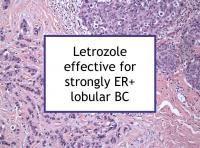A new study has reported that estrogen receptor rich (ER+) invasive lobular breast cancer responds well to pre-surgical treatment with the aromatase inhibitor letrozole (Femara). Neoadjuvant treatment takes place before surgery to remove the cancer whereas adjuvant treatment takes place after surgery.
Invasive lobular breast cancer has been reported to respond poorly to neoadjuvant chemotherapy but appears to respond well to endocrine therapy such as aromatase inhibitor treatment (which is normally started following surgery).
Postmenopausal women were considered for treatment with neoadjuvant letrozole if they had strongly ER+ tumors (with a large number of estrogen receptors on the cancer cells) that were large and operable or locally advanced (with positive lymph nodes or that had spread to other tissues near the breast such as the skin or muscle), or if the women were not healthy enough to undergo surgery. A total of 61 women with average age 76.2 years were enrolled in the study. Overall tumor size was estimated upon diagnosis and at three months using three methods: with calipers (by clinical staff), ultrasound, and mammography.
At the three-month mark, women who were physically fit enough were evaluated for surgery. Women whose tumors had responded favorably to letrozole (with a reduction in tumor size) but still had cancers too large for breast-conserving surgery continued with letrozole. Women whose tumors had increased in size were given surgery or were switched to another treatment.
The average reduction in tumor volume at three months was 66% when measured clinically, 61% when measured by ultrasound, and 54% when measured using mammography. (Note that mammography is not necessarily the most accurate method since lobular breast cancer can be difficult to detect on mammograms.) Surgery was possible at the three month mark for 24 patients, and all but two of the remaining patients continued taking letrozole for a median period of nine months. As of study publication, 40 patients had undergone surgery, with an 81% rate of successful breast conservation (using lumpectomy or partial mastectomy) in the 31 women for whom it was attempted (the remainder underwent mastectomy).
Twenty-one patients have continued to be treated solely with letrozole, and 19 remain controlled (without signs of cancer progression) on letrozole at a median of 2.8 years. The authors conclude that there is a high rate of response to letrozole in postmenopausal women with strongly ER+ invasive lobular breast cancer.
Please see our articles on lobular breast cancer prognosis and breast cancer diet during aromatase inhibitor treatment for more information.
